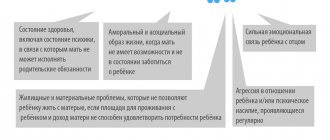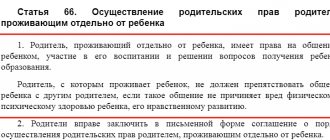Children
- How to talk about divorce
- How to avoid mistakes
- Psychologist's advice
- Don't forget about the children
- Don't ruin your children's lives
- Don't provoke manipulation
- Children should have a family
When spouses decide to separate, they need to remember that this can be a real tragedy for their children. A wise person would probably say that you need to think about this before having children. Often, when starting a family, people think only about pleasure. The pleasure of being close to a loved one, traveling, sharing a marital bed.
Few people think about responsibility. Family is work, it is work on oneself , it is the ability to preserve love.
Finding themselves not old enough, mothers and fathers endanger those who are even younger and even weaker - their little children
They will now have to grow up, and it would be good if this sad event forced their parents to become adults.
Divorce of parents
What to do if your daughter divorces her son-in-law
Whatever the circumstances of the family breakdown, all parents, without exception, want their daughter to be happy after the divorce. It seems that just recently my daughter was a little girl for whom her parents could solve any problem. Well, the girl grew up and got married. Now you can be calm about your child, but like a bolt from the blue the news appears about the end of your daughter’s marriage.
Parents, stunned by the news, do not yet understand how to help their daughter survive the divorce, and they make a common mistake - they begin to regret taking care of their adult child with all their might. Yes, caring for a divorced girl during this difficult period will not hurt, but there must be a limit to everything - there are simply funny situations when a mother out loud convinces her daughter that she has her whole life ahead of her and at the same time behaves as if there is a dead person in the house - constantly cries and speaks in a hushed tone. General pity often becomes a reason for depression in a divorced woman, from which it is quite difficult to get out.
For some reason, sometimes many parents bring to the forefront the question of how exactly they should survive their daughter’s divorce from her husband. After all, it’s about their reputation - what will neighbors and relatives say, they don’t just leave good girls. Not knowing how to cope with the divorce of their daughter and son-in-law with dignity, the father-in-law and mother-in-law completely shift the blame to their ex-husband, trying to protect themselves and their child. For a while, the parents forget that their daughter is going through much more than they are, because it is her family that has been destroyed, and it is unknown what to do next.
At the time of the child’s divorce proceedings, parents need to forget about their feelings and think about how they can alleviate the condition of their loved one. If there are children in the family, it is better if they spend a few days with their grandparents. A tearful mother is unlikely to be able to give them due attention. At the moment, it doesn’t matter how the mother or father feels about her daughter’s divorce, the main thing is to remind the child that she has close people who are always ready to help. At the same time, you should not be too intrusive, as this most often irritates girls under stress.
When to contact a psychologist
But sometimes, even if the parents did everything right, the child cannot cope with the situation. Here it is very important not to miss the moment when it is still easy to help him not to plunge into a deep depressive state, from which only a qualified psychotherapist can bring him out.
You should definitely contact a psychologist if:
- the child cries often;
- he became withdrawn;
- his academic performance dropped sharply;
- uncontrolled aggression appeared;
- the child often throws tantrums;
- he sleeps poorly or takes a long time to fall asleep;
- began to be afraid to be alone;
- wakes up crying or screaming;
- categorically refuses to go to school or kindergarten;
- he began to have nightmares;
- he developed a fear of death.
The parents' concern in this case is completely justified. In a depressed state, a child can not only commit inappropriate actions, but also commit suicide. A psychologist will assess how much he is worried and give advice on how to help the child overcome a difficult period.
How to help a daughter experiencing a separation from her husband
A woman during a period of separation from her loved one is very vulnerable - her self-esteem is low, she feels abandoned and useless to anyone.
Therefore, it is very important to hear from loved ones that they love her. A daughter may not always be ready for frank conversations, but with the right approach, this time will definitely come. A psychological technique works great here - you need to be as open as possible with your child, tell her about your personal dramas. In most cases, this helps the daughter realize that she is not alone in her experiences. This will help bring out everything she's been holding inside. After such an emotional outburst it becomes easier.
Sympathy is sympathy, but sometimes a recently divorced girl needs a good shake-up to keep her daughter happy after the divorce. A good option for a woman to come to her senses would be a joint hobby. It’s clear that you shouldn’t propose to your daughter the day after the divorce - let’s go to the mountains. She needs to cry for a couple of days and collect her thoughts. But after a few days, you can surprise your daughter - buy a ticket to the sea or an excursion tour.
Depending on family traditions, one of the parents or a friend can go on a trip with the girl. A good option to get used to a new life would be to travel together with your daughter and her teenage grandchildren. Taking care of children will not allow a woman to get bogged down in her worries, and a son or daughter will be able to feel that their mother needs them.
Why is it important?
The key to children's mental well-being is separating the personal relationships of ex-spouses from the interactions of co-parenting. Through the partnership of the parents, the child realizes that he is more important than the quarrels and disagreements that ended the marriage.
For normal personality development, a little person must know that maternal and paternal love prevails over the experiences of adults.
For preschool children
Babies with contact with both parents:
- They feel protected. They know that if problems arise, wise mentors will come to the rescue.
- They do not suffer from irrational fears or fear of loneliness. They don't worry about the future.
- Have no problems sleeping.
- They are happy to make new friends and play normally with friends.
- Calm, balanced. They accept parental demands favorably.
For younger students
Children raised by divorced parents together:
- Adapt faster and easier to new life circumstances. Experience less stress at school.
- They know how to follow the rules and maintain discipline. Understand the fairness of punishments and rewards. They know what to expect if established norms are violated.
- Easily absorb new knowledge. They willingly attend sports clubs and are members of creative groups.
- Have healthy role models. Seeing the cooperation of parents, children carry this model into the future, which allows them to build and maintain strong family relationships.
- Healthy in the psychological aspect. Insured against the development of depressive, anxiety, panic disorders, ADHD.
- Have full contact with peers.
- Have adequate self-esteem.
For teenagers
Boys and girls interacting fully with their parents:
- Adequately assess their own personality. They do not suffer from an inferiority complex, self-abasement, or ideas of guilt.
- Capable of full communication in society. They are not afraid of new acquaintances. Ready to compromise in order to maintain normal relationships with adults and peers.
- Find the best way to solve problems. They know how to effectively overcome obstacles.
- They do not seek to escape reality with the help of alcohol and drugs. Do not join antisocial groups.
- Motivated for development. They strive to expand their knowledge and acquire new skills.
For adults
Parents who have full contact with their child:
- Insured against depressive disorders. They do not suffer from feelings of guilt and remorse.
- They feel happiness from the successes and achievements of the little person.
- They have no fear of the future.
- Able to competently plan time and allocate budget. They have the right priorities.
- They enjoy spending time together. Quality rest and vivid impressions prevent stress and nervous breakdowns.
- They care about their health because they know that their physical condition directly affects the well-being of their children.
How to make it easier for your daughter to separate from her husband
The model of behavior that determines how to really help a daughter survive a divorce from her husband largely depends on her psychological type. If a woman is prone to depression, lies down all day and refuses food, she cannot cope with this on her own - she needs the help of a professional psychologist. Don't think that sooner or later everything will go away on its own. Time heals, but there are stories when a woman could not recover from a family collapse throughout her life.
There are also opposite stories - when the breakdown of a family causes aggression in the ex-wife and a desire to take revenge on the other half. Such emotional ladies find relief in constantly ruining the life of their ex-husband, maintaining a feeling of hatred in themselves. Children often become instruments of revenge. Under the influence of feelings, they do not care at all what the situation looks like from the outside; they are simply unable to think about it. In this case, you need to switch the woman’s violent energy to other problems - ask for help around the house, go to visit relatives, make repairs, etc.
Psychological reasons for refusal to communicate
A typical situation in a high-conflict divorce is the refusal of one parent to have contact with their own child. Reluctance to communicate with the heir arises for various reasons, including :
- A withering feeling of guilt for the broken union . The ex-husband considers himself unworthy to communicate with his son or daughter. He is afraid of reproaches from the child.
- Anticipation of unpleasant communication. The co-parent thinks that the meeting with the child is intended to receive messages from the ex-partner.
He is convinced that the other parent is using harmful and offensive strategies and manipulating the child for his own purposes.
- Denial of divorce . The abandoned partner believes that the ex-spouse needs time to come to his senses.
- Selfishness . The adult refuses contact with the child in order to prove that without his participation the lives of others are difficult and problematic.
- Greed . A stingy person avoids discussions about money. He does not consider it necessary to spend personal funds on the child in excess of the amount of alimony established by law.
- Substance abuse, addictions . A person who takes drugs, alcohol, or an avid gambler degrades over time. Universal human values are alien to him. Dependency deprives him of understanding the importance of caring for offspring.
- Perceiving communication with the baby as a tedious, annoying task . A person who cares about his own comfort does not want to deal with whims and waste time on the care and development of the child.
- The parent is overwhelmed with resentment and anger . Does not separate emotions from responsibilities. Unable to constructively express feelings.
- The past caused a lot of torment and suffering . Not wanting to return to the past, trying to avoid reminders, a person makes decisions to destroy ties with the past.
Sometimes both parents completely abandon the child after a divorce. They leave their children in the care of their relatives and grandmothers.
This is typical for people who become mothers and fathers at a young age. Having given birth to a child, they choose as a priority not the development of the baby, but the organization of their own life. They try to get an education, build a career, and sometimes go to work in other countries.
A terrible reason why parents abandon their children is addictions . People who use drugs or have an alcohol addiction tend to fail to parent. For them, a child is a burden that prevents them from leading their usual asocial lifestyle. It is very difficult to influence such a choice, since drug addiction and alcoholism are chronic diseases that require long-term treatment and rehabilitation.
The impact of relationship deficits on children
Children react differently to a lack of contact with their parents. Their experiences and reactions depend on age.
- Young children often “stick” to one parent, refusing to be separated from them. Children often have trouble sleeping, start wetting the bed again, and become moody or withdrawn.
Other kids demonstrate disobedience and aggression, throwing toys, biting or hitting peers and adults.
- Children of primary school age do poorly at school or look for ways to avoid attending school. They act to force parents to intervene, for example by starting a fight at school. Experiences are reflected on the physical level. The child complains of headache, abdominal discomfort, dizziness.
- Teenagers escalate the conflict, clearly preferring one parent, and they themselves refuse the company of another adult. Boys and girls behave aggressively with peers, resort to lies, and refuse to attend school. Since teenagers are in a difficult transitional age, they experience conflicting feelings - from loneliness to an obsessive fear of social contacts.
These experiences are often difficult to recognize without professional intervention. Youth often turn to drugs or alcohol as a way to cope. They can become sexually active, engaging in promiscuous, unprotected sex.
Minimizing the consequences of a lack of contact
To create a favorable climate, follow the steps:
- Explore your own role. Recognize that your actions and words may have created the problem. Identify dysfunctional ideas, replace them with constructive thoughts. Don't let your emotions control your actions.
- Be aware of the current situation regarding the child. Awareness is the key to responding to a problem in a timely manner.
- Think about what you are going to say and do, study the likely consequences of the action.
- Talk to your ex-spouse about the impact of his refusal to communicate with the child. Try to convince him of the importance of co-parenting.
- Become attentive, careful. Never underestimate a child's ability to manipulate, especially during stressful times associated with divorce.
- Set boundaries and consistency around core issues (bedtime, homework, eating right). Your baby may not always like it, but consistency will be beneficial in the long run.
- Provide confidence. Although it is impossible to control the actions of an ex-spouse who is not eager to communicate, it is necessary to encourage the child and show a pleasant perspective. Talk to children about love. They need to hear words of caring.
- Convince your daughter and son that they are not to blame for the breakdown of the family and the behavior of the co-parent. Try to explain complex things in simple terms.
- Take your development to the next level. There are countless books on the topic of raising children. In most cities, classes are held that will become a source of information about the rules for creating a healthy psychological climate.
- No spying or secrets. Don't ask your child to keep an eye on your ex and report what your ex-spouse is doing.
- Don't force contacts. It is impossible to force an ex-spouse to communicate with a common child. Accept his refusal as a fact, do not dwell on the past. Start building a happy life without his participation.
Ways for a girl to recover after breaking up with her husband
How else can the parents of their daughter help during a divorce? During a period of stress, the girl may need a vacation, because a woman who is always upset and immersed in her problems is not an employee.
It is logical that this will affect her well-being, and if the parents have such an opportunity, they can support their daughter financially. If mother and daughter are close to each other in spirit and are close friends, at the moment of distress such cohesion will help the divorced girl to perk up. Anything will do - a trip to the spa, a movie, bowling, a change of image and banal shopping - all this will help the girl unwind and come to her senses.
Another way to help your beloved daughter survive a divorce from her husband is to remind the girl of her attractiveness in the eyes of the opposite sex, remember life stories related to fans, and so on. This is a good incentive to pull yourself together. But sending your daughter and her friends out to a bar or nightclub immediately after the divorce process is not the best idea. A girl in a difficult emotional state is capable of doing stupid things that she will regret.
If the husband threatens to take the child and sue, the procedure
If a spouse leaves a child, he needs to think through his actions. Documents will be needed for the trial.
Where to go?
Resolving the issue is impossible without the participation of guardianship and trusteeship authorities. Before going to court, a man must have an opinion from this organization. Guardianship officers will visit the home of the former spouses and make a decision, which will reflect:
- material and living conditions;
- sanitary condition of the premises;
- family relationships, etc.
When making a decision, the court relies on the opinion of the guardianship and trusteeship authorities. Convince representatives of the organization of the advisability of transferring the offspring to you for upbringing.
Documentation
- Statement on the claim, if the man is the initiator of the divorce. In it, he indicates why he wants to take the baby into his family and not leave it to his ex-wife. The reasons must be justified in order for the assessors to make a positive decision.
- Certificates confirming income.
- Documents confirming ownership.
- Certificates of inspection of the living conditions of both parties.
- Medical examination of the wife for the presence of alcohol or drug addiction, mental problems.
- A certificate confirming that the father does not have such problems.
- Protocols from the relevant authorities on the inappropriate behavior of the spouse, which endangered the health of the minor.
- Characteristics of the place of work and residence of the husband and wife.
- Other documents characterizing the father from the positive side.
All this will increase the chances of receiving a positive decision from the judicial authorities.
How a mother-in-law should behave with her ex-son-in-law
How to behave as a mother-in-law when your daughter divorces is another pressing question, the answer to which is clear. Whatever your relationship with your ex-son-in-law, you should not constantly discuss him in front of your daughter. This applies to both the shortcomings and advantages of a man. In the first case, the woman will definitely not feel any better from the realization that she has not lived with the best person for several years. Besides, whatever one may say, he was and remains the father of her children. No matter how difficult it is to survive the divorce of your daughter and son-in-law, you must try to help them maintain a normal relationship, at least for the sake of their grandchildren.
If the mother-in-law had an excellent relationship with her son-in-law, you should not remember this in front of your daughter immediately after the separation. Now is not the time to think about how to react correctly to your daughter’s divorce and whose side to take. That's why parents exist, to always be on the side of their child, even if a fair share of the blame for the breakup of the family lies with the daughter. And you certainly shouldn’t try to forcibly reunite the family - neither the mother-in-law nor the father-in-law can do this. In the end, ex-spouses are adults and will decide for themselves whether they need each other. It is likely that such an emotional shake-up will have a positive effect on the relationship, and they will live together happily ever after.
No matter how the parents react to their daughter’s divorce, one should not approach it as the collapse of one’s entire life. You need to support and let your child understand that this is a chance to start a new life and build a relationship in which the daughter will definitely be happy.
Voluntary agreement
Based on Part 1 of Art. 24 of the Family Code of the Russian Federation, in the event of termination of marriage, spouses may enter into a voluntary agreement on the place of residence of a minor child. This document is submitted to the court for consideration and allows the former spouses to independently resolve the issue of leaving the child to one of the parents.
Even if the agreement was drawn up in simple written form without the participation of a notary, it still has legal force. Therefore, the parties are obliged to comply with all the conditions stipulated therein.
Features and conditions for drawing up a voluntary agreement
This agreement is concluded in writing and is considered legal if its contents reflect the will of the signatories. It operates on the principle of “from the particular to the general” - a comprehensive agreement of both parents, considering issues of upbringing and communication along with alimony. If the woman signed it under the pressure of her husband, then this transaction is canceled.
The court is also obliged to study the parental agreement and check it to ensure that all the interests of the minor are fully respected. Details that are required to draw up a voluntary agreement:
- Full name of parents and child;
- passport details of the spouses;
- date of birth of the minor;
- terms of the agreement, procedure, restrictions;
- date and place of conclusion of the contract;
- personal signatures of the parents, as well as the date of signing.
In addition to determining the place of residence of a daughter or son, former spouses can stipulate in the contract:
- participation in the educational process and upbringing;
- the amount of child support that the mother is obliged to pay;
- place and time of visits with the child, as well as spending vacations, holidays and weekends together.
The Family Code does not provide for any requirements for drawing up this agreement. Only its individual points are spelled out in Art. 100, 101 of the RF IC for an agreement on alimony.
Give thanks rather than criticize
The ex-spouse may help in some way, but if you criticize him for this, then you can be left without help at all. You also don’t want to do something for a person who, instead of saying “thank you,” regularly grumbles/screams after him: “You always do everything wrong!”, “Again, you’re at the wrong time,” “Okay, nothing is needed, without you.” Let's figure it out! " And, on the contrary, how nice it is to feel important and needed! It is clear that mothers often do not like the way their ex-husband behaves with the child: he dresses the child in the wrong way, feeds him the wrong way, shows the wrong films... But the child cannot have an ideal father. He will have this dad - with his advantages and disadvantages... or none at all. So, if the child is not in danger, it is wiser to put up with the educational approaches of the existing dad and happily accept even his minor help.
“The ex-husband quite often picks up the child from kindergarten, takes him to the pool and other activities. I never relieved him of his responsibility to provide for and care for his son. Maybe that’s why he doesn’t relax, he helps as much as he can. From time to time I say: “The child loves you, so you must be an example for him.” By the way, with my ex-husband’s first child, everything is much more complicated, so I consider the established relationship between father and son to be my merit.”









